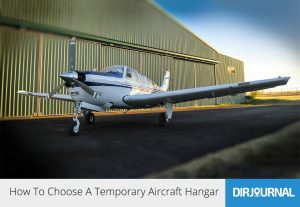

Portable fabric aircraft hangars are getting increasingly popular as a storage solution and temporary shelter. Many reasons drive the rise of these temporary shelters, including diversity, rapid installation, and affordability. Whether you are looking to store vehicles, aircraft, or equipment, mobile aviation hangars provide a great solution.
You should consider several things before choosing to install a temporary hangar. To make sure that you select the right structure, you should conduct some research to inform your decision.
Here are some useful tips:
Not all hangar manufacturers provide the same features. You need to confirm whether walk-through access or sliding hangar doors are available. Moreover, you should find out the features that you could add to your mobile hangar because some of them are more important than others.
Some governments provide funds for constructing aircraft structures. You may also find that leasing out a temporary structure is cheaper than buying one in the end. Moreover, the construction of a permanent structure takes time and costs a lot of money.
If your hangar is located at a seaport, railway, or private airstrip, you need to clarify the facility’s needs for a layout of building groupings. You should start familiarizing yourself with the FAA’s structural requirements.
You must take measurements to establish the correct dimensions of the hangar. Whether you want to house cargo, aircraft, or vehicles, your hangar supplier will require these measurements. Make sure that they include the height clearance as well as floor space.
How many planes will you be housing in your hangar? The layout of the structure depends on the number of aircrafts that you will be storing and their arrangement. Will you park the planes side by side? If so, you might require slightly less space than if you put more space between them.
Once you have figured out the basic requirements, you should consult with several manufacturers to compare the important elements, which include baseline price, duration to completion, warranty provisions, customer testimonials, and safety records.
Once you figure out the size of your mobile hangar, you should start thinking about the types of doors that you need. Bi-fold doors that fold over themselves then swing towards the ceiling are an excellent choice. You can also opt for slider doors with tracks along the bottom or top of the hangar that let the door slide open in several pieces.
Hydraulic doors usually swing up and out to produce an overhang effect that creates more headspace inside the hangar. Choosing a hydraulic door means that you have to consider the central role it plays. Depending on the type of door that you select, you also need to look at the frame.
What material will the hangar be made out of? Prefabricated steel buildings are a great choice if you are looking for durability and sturdiness because steel is a very strong material that can withstand the elements. Other materials such as wood do not last very long and are thus not a great choice for storage hangars.
When considering the materials that you need for your temporary hangar, you should think about expected climate conditions. Some climates require sturdier materials than others do if you want the hangar to last.
If you choose to build your own hangar, you need to do plenty of research before you start the project. First, you should plan for the space that you require. Next, you should decide on the type of hangar door you need. Are you looking for a reliable hangar manufacturer? You should consider leading companies like American Steel Span.
View Comments
All the tips that are mentioned above really helped me to search for hangar next time. Few days ago, I was so confused when I was searching for a temporary aircraft hangar. I found many companies but finally, I was satisfied with Aviatech Aircraft hangars that are able to remote locations without compromising quality or comfort.